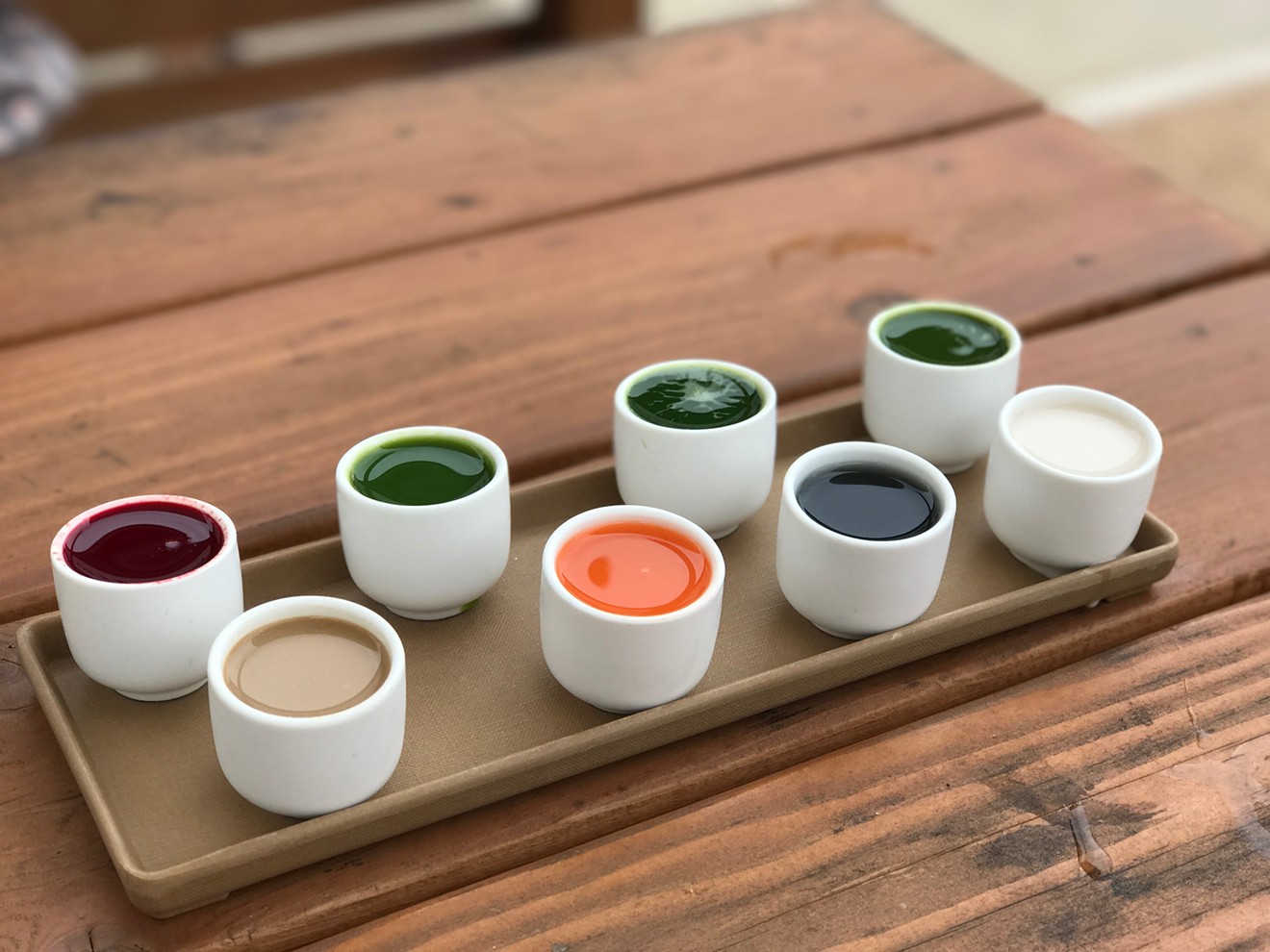Twenty years ago, going to a juice bar meant grabbing an Orange Julius or, if you were lucky, stumbling upon a Jamba Juice. Times have changed.
In the Dallas area, high-information, health-conscious consumers have their pick of modern juice bars created with stringent dietary goals and restrictions in mind: Local Press + Brew, Buda Juice, I Love Juice Bar, I Am The Juice Place, Boom Juice, The Gem, Roots Juices, Brewed + Pressed, JuiceLand — and the list goes on.
Today’s gold standard of raw, organic, cold-pressed juice in recyclable glass bottles first began seeping into the public consciousness via clean food startups in the early aughts, but at the time, it seemed more like the health drink du jour for celebrities and other moneyed trendsetters in New York and L.A. than a movement that would catch on with the proletariat. But unlike fad diets and food crazes on the opposite end of the health spectrum (remember cronuts?), the all-natural juice bar has not only survived but also grown and diversified to the point that it can no longer be called a trend with any seriousness.
Inside of the larger health and wellness industry, juicing has become a hot lifestyle market. And in Dallas, particularly over the last five years, that market is booming.
In 2015, married couple Ben and Tiffany Johnson opened Dallas’ first locally sourced juice and coffee parlor, Local Press + Brew, in Oak Cliff.
“We came up with the concept of a natural juice bar where we juice raw, organic juices onsite, with the cold-pressed juice on one side of the café and a craft coffee bar on the other,” Ben Johnson says. “We saw that there was nothing else like that in Dallas and not a lot of that going on anywhere in the country.”
To stay in business and compete in the now-crowded local marketplace, each juice bar in the Dallas area has to carve out a niche. For every juice bar that closes, like the Oak Lawn outpost of Austin-based Daily Juice or the short-lived Roots on Tap in Exposition Park, a new juice bar opens that offers something the others don’t.
I Am The Juice Place, which opened downtown last summer, is the only Dallas establishment that provides cold-pressed juice made to order in front of the customer. Buda Juice, with a kitchen in the Dallas Design District and several grab-and-go locations across the city, is the only Dallas juice bar to cold-press at an optimal 35 degrees. I Love Juice Bar, a Nashville-based startup with several locations opening in and around Dallas this year, offers plenty of snacks, seating and 64-oz. glass growlers for refills. Boom Juice, another young Dallas business, sells an extensive and rotating menu of cold-pressed, low-fruit juices at the Saint Michael’s Farmers Market.
For the most part, the businesses peacefully and supportively coexist. However, Johnson says that Local Press + Brew has filed a lawsuit against Brewed + Pressed, which opened in West Village last year, for trademark infringement.
“The first week we were open, the owners of Brewed + Pressed came in, asked all sorts of questions and checked us out,” Johnson says. “About a year and a half later, they opened with a very similar name.”
The concept, too, looked familiar: a health-focused juice bar and coffee shop with an Instagrammable interior and a menu of plant-based fare.
“We didn’t have any problem with them opening with a similar concept,” Johnson says. “We even sent them so many really nice letters being like, ‘Hey, we really want to encourage raw, organic juice and plant-based food concepts; we just ask that you change your name because it’s really confusing to the consumer.’ And we feel there were no ethical responses that we got back from them as to why they’re doing what they’re doing.”
Brewed + Pressed has not responded to repeated requests for comment.

Austin import JuiceLand moved into Sylvan Thirty last year, offering up a massive menu of fresh juices and "superfood smoothies."
Beth Rankin
“There are two different concepts out there: raw and organic and usually in glass bottles; and then there’s the pasteurized or high-pressure pasteurized juices in plastic bottles,” Johnson says. “And those are usually with juice distribution companies who sell to Whole Foods, Starbucks or other grocery outlets.”
Johnson adds that he and Horatio Lonsdale-Hands, the co-owner of Buda Juice, once met up in a Whole Foods in Dallas and had an “interesting conversation” about the juices on display.
“Those juices have shelf lives between 15 and 20 days,” Johnson says. “They’re long-life products: They’ve gone through a pasteurization process that has depleted their nutritional value and the enzymes you need for raw, organic juicing.”
By focusing solely on juice and cleanses, Lonsdale-Hands says, Buda Juice can zero in on the quality of its product so that only the freshest and certified organic produce makes it into the Dallas kitchen.
“We inspect it, label it, wash it and cut it, and then it goes into the juicing room, where we juice, bottle and, in our own refrigerated vans, take them to our stores,” Lonsdale-Hands explains. “So typically in five days, the juice goes straight from the organic farm all the way to the consumer.”
In the Buda Juice kitchen, the produce is cold-pressed at 35 degrees rather than room temperature, which keeps the juice fresh and all of the nutrients, micronutrients and enzymes intact, according to Lonsdale-Hands. This and the high quality of the produce make a huge difference, Lonsdale-Hands adds, “because if you’re consuming 4 pounds of veggies condensed into a little bottle, you have a cocktail of pesticides if it’s a conventional juice, rather than certified organic.”
Buda Juice also comes in glass bottles, "so it not only feels good, looks good and tastes good, but it's good for the environment," Lonsdale-Hands says. "And of course, there are no chemicals leaking into the juice from the plastic."
Another difference among local juice bars is the use of centrifugal juice extractors versus masticating juicers. Masticating or cold-press juicers extract juice by first crushing and then pressing fruit and vegetables to produce the highest juice yield, while centrifugal juicers separate the juice from the fruit or vegetable using the centrifugal force of a spinning metal blade. A spinning blade generates a lot more heat than a press.
The upside of centrifugal juicing, however, is convenience and affordability. Because cold-pressed juices take a considerable amount of time to make and are considered "nutrient dense," the average bottle is $10 to $12. Meanwhile, the average price of juice at at I Love Juice Bar, which uses centrifugal juicers, is around $7.

At Roots Pressed Juices on Oak Lawn, employees push juice fasting and cold-pressed juices along with smoothies with add-ins like bee pollen and activated charcoal.
Beth Rankin
“I believe people are now realizing the health benefits of drinking juice rather than processed, sugary drinks,” Patel says. “I am a family nurse practitioner by trade, so educating my patients about nutrition is natural to me. It is very rewarding to see that patients heal faster and feel better once they change their diets.”
The main customer base for the juicing industry is changing too, from the stereotype of the young, affluent white woman on her way to yoga class to people from a wide range of backgrounds.
Jessica Ventouras, who co-owns Boom Juice with husband Davio, says they sell to “a lot of cancer patients and high-information consumers” — people who can’t or won’t cut corners for medical or health reasons. Ana Jones, owner of I Am The Juice Place, says some of her customers come in because they’re staying at hotels downtown and have a juice ritual, but many more are first-timers, or “not even into being healthy but like the taste of our products.”
Lonsdale-Hands says that when Buda Juice opened, “70 percent of our business was women in their 20s and 30s … but then they started telling their boyfriends, parents, grandparents and friends.” Now a huge chunk of his customers come from he calls the “need generation”: people in their 50s through 80s and younger people who have persistent health issues that they claim juices like those from Buda Juice have alleviated.
“We have Asian customers, African-American customers, Hispanic customers,” Lonsdale-Hands says. “We have truck drivers coming in to buy our juice; we have lots of blue-collar people coming in and enjoying our juice.
“They’ve either heard about or read about the benefits of juicing, or they’ve walked by and tried it because we give out free samples of all of our juices for people to try before buying them,” he says. “Ultimately, they’re doing it for their health.”
And that gets to the heart of the juicing phenomenon: If people believe that juice bars are providing life-changing health benefits, they’re not going anywhere.
“Juicing is a business; we do run a business,” Johnson says of Local Press + Brew, which will soon expand to a second location at the Victory Park entrance to the Katy Trail and a third location in Plano. “But if people are shopping around for juice companies and juice bars, they’ll quickly recognize those places that really focus on nutrition, as opposed to those who are just doing it for the business.
“You’ll see companies that come around that are jumping on the bandwagon, the trend, but their heart isn’t in it, and people will figure that out,” Johnson says. “I like to think, with Tiffany and with our staff, we’re doing what we’re doing for the good of the consumer. We’re a company with a conscience. We offer our juice as a benefit, and that’s why we do it.”












